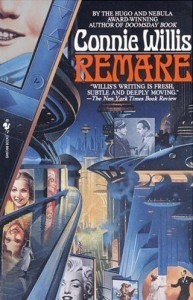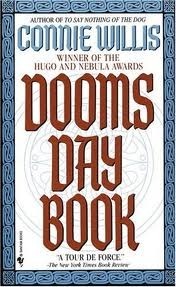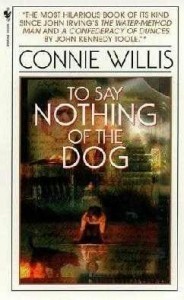A Reader's Guide to Connie Willis
 You know how brilliant it is when you love an author and then you get to see new people discover that author and it's so EXCITING?
You know how brilliant it is when you love an author and then you get to see new people discover that author and it's so EXCITING?
Well, Connie Willis is one of those authors for me, and Alisa, one of my favourite people, just met Connie and then started reading her work this weekend and now wants to read everything she's ever written, which I can totally understand because that's how I felt the first time I heard Connie speak. (it was at Swancon where she read the first chapter of the then-unfinished ms of Passage)
So rather than just tweet recs at Alisa, I thought I'd post a beginner's guide here. Feel free to chime in with your own comments about the works, particularly the ones you disagree with me on, though try to keep reasonably spoiler-free if you can!
HOW TO CHOOSE YOUR NEXT CONNIE WILLIS
Fire Watch (1982, published as main act in a short story collection of the same title 1984)
Her first major work, the beginning of her love affair with the Blitz as a historical period, and the first story to feature the time travelling "historians" from Oxford. A great place to start!
won Hugo & Nebula
Lincoln's Dreams (1987)
This is my blind spot, the only Willis novel I haven't been able to enjoy. I've heard so many people refer to it as a classic book and a work of brilliance, though, that I'm loathe to dismiss it. Not sure if it's a me thing or a not being American thing, or what. I'd love to hear from you if you liked it, and why.
won John W. Campbell Memorial Award
 Doomsday Book (1992)
Doomsday Book (1992)
A magnificent though emotionally gruelling tale of another Oxford historian, the first to travel back as far as the Middle Ages, despite everyone telling her it's a bad idea because of all that Black Death. And then, you know, she gets stuck in a village under siege by the Black Death. I usually tell people that this is one of the best novels I've ever read and one I never want to read again… but since Blackout/All Clear I've been wanting to go back to it, damn it all. It's amazingly intense, the kind of novel that needs an isolated weekend, a kilo of chocolate and a jumbo box of tissues, but it's also a brilliant exploration of time travel and history.
won Hugo, Nebula, Locus SF Novel
Impossible Things (1993)
One of my favourite short story collections ever, and one I regularly return to for re-reading. It includes many stories I adore, such as "Spice Pogrom" (Katherine Hepburn Cary Grant screwball comedy in space), "Jack" (another Blitz story with a paranormal twist), and "Even the Queen," (a story that predicted the technology to suspend or limit menstruation, and looks at the ways that this could affect womanhood and social attitudes – it's rather quaint now in retrospect but remains an important footnote in the history of women's science fiction).
Remake (1994)
While I have been tinkering with this post, Alisa read this one already! This short novel is a love letter to Fred Astaire and Ginger Rogers, and it's one I regularly think about because it revolves around a quite awful and yet horribly believable future of Hollywood in which there are no new films, just constant remakes of classics with digital renderings of different famous actors. (Want Avatar with Gene Kelly in the lead?) The main character is utterly demoralised by his job, deleting evidence of addictive substances from classic films (his attempts to turn Rick's Bar into a coffee shop are hilarious, as is his discovery that the Philadelphia Story makes no sense without the existence of alcohol). His life changes when he meets the only person in Hollywood who still believes that movies should be about something real…
Uncharted Territory (1994)
This is Connie Willis does hard science fiction and I love it greatly. It is of course all about people, but they are people doing their best to explore an alien planet, and being both challenged and bemused by all manner of genderfuckery.
Bellwether (1996)
Another brilliant and tightly thematic short novel, this one is about scientists and science funding and what's the point of funding science if all the best scientific ideas come to people when they're in the bath or on a bus? It's also about fads. Completely, crazily obsessively about the complex history fads. It's the kind of book that makes you look at the universe differently for… well, ever, but specifically for about six weeks afterwards.
 To Say Nothing of the Dog (1998)
To Say Nothing of the Dog (1998)
This book is so beloved that it's almost a cliche to love it best, and there are so many reasons to adore all the others but OMG this is the best book ever! That is, if you love Victoriana and 1930's murder mysteries and unadulterated adoration of so-English-it-hurts cultural history. Another book in the Oxford historian time travel series, this is the light hearted comedy of manners to make you feel better about the world after The Doomsday Book has ripped your heart out and left it bleeding on the floor. Verity and Ned are one of my favourite romantic couples ever, and their antics around church fairs and seances and the bishop's bath stump delight me from beginning to end. This is the book that sold me on Dorothy Sayers, and I have never looked back.
Won Hugo & Locus SF Novel
Miracle and Other Christmas Stories (1999)
This collection of stories that Connie regularly wrote for the Asimovs December issue is a mixed bag – some more sentimental than others – but is totally worth it for "Miracle," one of her screwball comedy riff stories (someday a canny publisher should put together a Willis anthology that combines Remake with a bunch of her other Hollywood/movie themed or inspired stories). This story is a love letter to Christmas movies, and to all the traditions that go along with those movies. It's also a 'give me a break' letter to It's A Wonderful Life, the main thesis being that it is an overrated Christmas movie and the omnipresence of it during the festive season is actually kind of sinister.
Passage (2001)
I wanted to read this book more than a year before it was published, when Connie Willis read the opening chapter at Swancon and blew me away. It's a compelling, soul-sucking narrative about a woman trying to run a study on what people actually SEE during a near death experience, and constantly being frustrated by a rival whose methods are ethically problematic and tend to warp the evidence ("So, did you see a white light? Did you walk towards it? Were all your favourite people who have passed on already waiting for you?") As with all Wills books, it builds a community so compelling and lovable that you don't want to leave. Which means of course that when the bad stuff happens, you feel it like a deep sucking wound in your stomach… I've cried buckets over books before and since but this book gave me possibly the most visceral memory of sobbing over a book that had broken my heart in the best possible way. I love it dearly, though I don't know if I can ever go back there for the reread. Also, this is the book that introduced me to the word "confabulation" which is an awesome thing and a surprisingly useful addition to the vocabulary.
won Locus SF novel
"Inside Job," (2005) "D.A." (2007) and "All Seated on the Ground" (2007) were all published as single titles but unlike Uncharted Territory, Bellwether and Remake none of them quite have that epic theme feel about them to warrant that kind of separate attention, or the status of short novels rather than long short stories. Once you're the kind of reader who wants to inhale everything Connie Willis writes, they're very enjoyable, but I wouldn't recommend them as the starting point. "All Seated On the Ground" needs to be retrospectively inserted into the Miracle and Other Christmas Stories anthology. Oh and yes, they did the job of whetting our appetite while we all sat around and waited for the next Connie Willis novel…
Blackout/All Clear (2010) is a masterpiece. I would absolutely recommend it to any reader, regardless of their Willis history, and in particular I think it's a great one to get for genre-agnostic parents at Christmas, or anyone who is into wartime British history. BUT it is hugely important to remember that this is one book in two volumes, and you shouldn't start one unless the other is nearby. A long gap between reading one and the other will kill the true experience of the book, the rhythms and the pacing of it. I also think that while it's a great book to hand to a new reader, for anyone who intends to become a Connie Willis completionist (yes you, Alisa) it should be left until last. There's a dizzying height about this book which makes so much more sense when you've followed the whole journey, and especially would be best read after The Doomsday Book, Fire Watch and To Say Nothing Of the Dog. The book will have a lot more power after having read those other books, as this is the one where she takes the world view lovingly constructed in the other Oxford historian books and blasts it into schrapnel. Having seen so much of Willis' love of and obsession with the Blitz danced around in other works, I can't help but be DELIGHTED for her that this brilliant book exists now, that she got to it, and that it's so very good.
When we nominate it for awards, guys, please remember to cite it as Blackout/All Clear rather than separating the volumes on shortlists. It's all about posterity.
HOW TO READ CONNIE WILLIS
I didn't realise this until I had gone through the post but I really think that, leaving aside the serialish nature of the Connie Willis historian books (Fire Watch, The Doomsday Book, To Say Nothing of the Dog, Blackout/All Clear, which can all be read in any order though I heartily recommend leaving B/AC until last) the best way to read Connie Willis is actually in chronological order. I wouldn't have thought that, and it's certainly not a definitive recommendation – you don't want to read The Doomsday Book or Passage if you're in a depressive frame of mind, and should wait to pick up To Say Nothing of the Dog until you're in a mood to be whimsical – but I do think that this is an author who has radically improved and matured over the decades, and that the progression from book to book is an interesting journey.
Also, if some nice publisher wanted to unite all of Connie's Hollywood and/or romance stories, that would be most excellent. I'd queue up for a copy.



